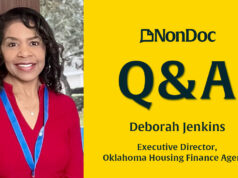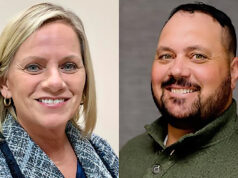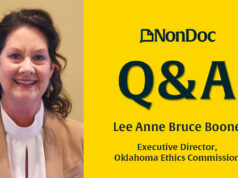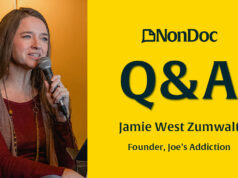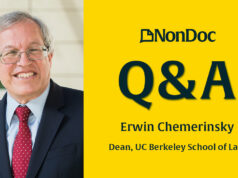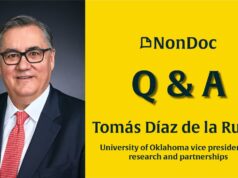

Over the past year, Americans have witnessed a number of tumultuous events: nationwide protests against police brutality, an ongoing pandemic, a contentious presidential election. All of these events have related in some way to the country’s history of race and racial inequality. And even the most horrifying news items, such as the brutal deaths of Black people at the hands of police, have spurred conversations that forward awareness and advocacy.
Andrea Benjamin is an associate professor in the Clara Luper Department of African and African American Studies at the University of Oklahoma. She was hired in 2019 and teaches courses that look at American politics through the lenses of urban areas and African American culture. Her work links political events to issues of race, ethnicity, language, religion and gender.
In 2017, Benjamin published her first book, Racial Coalition Building in Local Elections: Elite Cues and Cross-Ethnic Voting, which focuses on alliances between Black and Latino voters in local elections. She frequently comments on current events and debates, such as the removal of Confederate monuments and the recent U.S. Senate election in Georgia. Last summer, she wrote an op-ed in The Washington Post about the potential long-term impact of the protests following the death of George Floyd.
In this Q&A, which was conducted before the Feb. 9 elections she mentions, Benjamin reflects on her work as a professor, the importance of local politics and the change Black women have created in their communities.
The following conversation has been lightly edited for clarity and style.
Tell us about yourself. Where did you grow up? How did you get interested in African and African American studies, and how did you land in your position at OU?
My name is Andrea Benjamin and I am originally from northern California. I earned my undergraduate degree in African American and African studies and political science at the University of California, Davis. Then I went to the University of Michigan and earned my Ph.D. in political science. I always wanted to be in an African and African American studies department because, in undergrad, those were my favorite classes and where I received mentorship. It was a dream to be asked to apply for the position here at OU, even though I had just moved and bought a house. When I came to interview, I had a good experience, and I knew I could be productive and happy here.
What do you tell your students when talking about recent events? How do you approach it?
I approach recent events directly. I think the students are looking to their professors to provide a safe space to discuss the things that are going on around us. I also think the classroom is a great place to have these conversations because we know one another. I work really hard to create a collegial classroom environment. I know their names, and I use them so others will learn names as well. I ask them to be analytical and critical in their thinking. If we want to make claims, we need to have data to back up those claims.
I also am clear: I have no intentions of changing any minds, but I do hope that students learn to engage with an eye toward the facts and data. I am known for asking: What do the data say? Hopefully, students know they can disagree with one another, but they will do it respectfully.
It has been a couple of years now since you’ve moved to Oklahoma. You’ve written multiple articles on the impact citizen engagement has on state and local elections. Is there anything that stands out for you about community engagement in Oklahoma elections in particular?
Oklahoma is an interesting place. On the one hand, there are so many people working on the issues I care about, and people have been very welcoming to me, even though I am new here. So, in that sense, I know that people care and they are doing the work. In politics, you don’t always get your way, but so many people are out here trying to get things done.
On the other hand, the voter turnout in elections is really low. I am concerned when voter turnout is so low, because it’s hard to hold people accountable when people are not engaged in voting. I think the level of engagement is about the same as other places, but there are lower hurdles (not as much gatekeeping here), but the voter engagement is lower than other places I’ve lived. I was doing some research on the last set of municipal elections, and I was surprised that voter turnout was so low. I am hopeful that the 2021 City Council election will have a higher turnout because three of the four wards have multiple candidates running. I love that so many people were willing to serve the city in this way!
We recently had a new president inaugurated. As a Black woman in America, what is your reflection on the past four years? What are your hopes for the years to come?
The last four years have been challenging for many people. Yet, in my research, I saw so many people decide to run for local office because they thought they could serve others best in office. I love when young people run for office — it shows that they care. My hopes for the years to come are that we continue to engage in politics in a way that is meaningful. That can be voting, working for a campaign, contacting our elected officials, running for office, or showing up to city and county meetings. We have to engage — that is how our elected officials know what we want. When we are silent, they are left to guess our wishes. I hope people realize how important city and county elections are to our day-to-day lives. I know state and federal elections seem more important because we see more ads during those campaigns, but local politics matter a lot.
Black women have been a central force in flipping elected seats all across the country. Where did the drive come from?
For most Black women, the work they do isn’t political. It’s helping people. It’s connecting people. It’s solving a problem in the community. When Black women decide to engage in campaigns and political activity, it comes from the place of wanting to help those around them. I think we have to learn from Black women and their organizing, but it won’t be enough to simply replicate or duplicate. We have to actually be willing to learn from them. They know their communities, and they have been there doing the work. We have to ask, “Who is already doing this work? How can we support that work?” Then we have to be willing to do what they say. I’ve seen a lot of people enter communities and tell them what the community needs to do, and that’s the problem. We have to trust that the community knows what it needs, and, if they don’t, they can ask for help. The Black women we see having success have mastered this skill.
If you were to have dinner with three people, dead or alive, who would they be and what would you all talk about?
This is a hard question! There are so many good options. I would love to have dinner with Clara Luper (it’s been such a joy to learn about her life and legacy), Alice Moore Dunbar-Nelson and my teacher and mentor, Hanes Walton Jr. I would love to just discuss politics, the state of the world and get advice on how to serve my community and students better!









